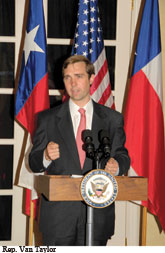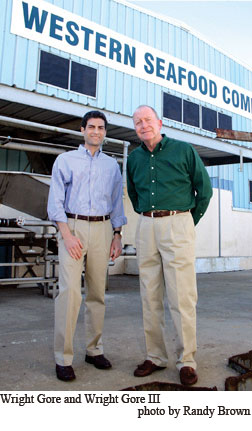Speak No Evil
Van Taylor was elected to the State House as an economic conservative with Tea Party backing. So why won't he talk about Texas' most famous case of eminent-domain abuse?

The government takeover of private land for economic development projects is a cardinal sin for property-rights conservatives. In one of the nation’s most notorious examples, officials in the Gulf Coast town of Freeport tried to seize land so a developer could build a yacht marina. The marina was supposed to transform the small, working-class Texas town’s struggling economy. Instead, Freeport’s marina became nationally known as a poster child of eminent-domain abuse.
Over the past decade, the battle in Freeport has ripped a town apart and changed the law of the land in Texas. So why would a new conservative member of the Texas House—a man who witnessed and participated in some of this heady history firsthand—not want to talk about it?
In an ideological mismatch, the blueblood family of first-term Rep. Van Taylor, R-Plano, was on the eminent domain side of Freeport’s marina fight—the side that gives many of Taylor’s fellow Texas conservatives hives. However, few in Taylor’s Plano-based district seem to know much about the issue, which never surfaced during his campaign.

To understand this tale of greed and conservative hypocrisy, a little history helps. Taylor descends on his mother’s side from the 1909 marriage of Humble Oil founder Robert E. Lee Blaffer to a Texaco founder’s daughter. Gov. James Hogg dubbed the union “the conglomerate of the century.”
Now fast-forward almost a century. In 2002, Taylor and 10 other young descendants of that marriage inherited a seemingly insignificant scrap of Blaffer wealth: nine acres on Freeport’s dingy waterfront. That beachhead is where Freeport’s imaginative officials envisioned a marina to attract wealthy people, shops and hotels to a city laboring under a petrochemical cloud.
Freeport officials wanted the marina so bad that they made the Blaffer heirs an offer that was hard to refuse. The city would loan the Blaffers $6 million to build the marina on land valued at $750,000. On paper, Freeport’s generous loan suggested to some that the Blaffers didn’t havemuch to lose. But they were putting their reputations at stake.
The marina project’s chief failing was that it did not limit itself to land already owned by either the Blaffers or local government. When negotiations with several adjacent landowners broke down in 2003, the city-controlled Freeport Economic Development Corp. invoked eminent domain to buy the disputed properties. The Blaffers soldiered on with the project despite its assault on property rights.
The marina debate in Freeport unfolded as a national debate over seizing private land for economic development was coming to a head. In 2005, a 5-4 U.S. Supreme Court majority ruled that a Connecticut town could use eminent domain to seize waterfront homes for a private developer. The majority and dissenting opinions in Kelo v. City of New London could have been written just as well about the Freeport marina. “Any property may now be taken for the benefit of another private party, but the fallout from this decision will not be random,” wrote dissenting Justice Sandra Day O’Connor. “The beneficiaries are likely to be those citizens with disproportionate influence and power in the political process, including large corporations and development firms.”
Rep. Taylor was not the Blaffer family’s front man on the marina. That role fell to his cousin, Dallas developer Hiram Walker Royall. On behalf of the Blaffer heirs, Royall agreed in 2002 to develop the Freeport marina.
When Freeport officials invoked eminent domain at the marina in 2003, Taylor was 7,000 miles away, doing a reserve tour with Marines who spearheaded the invasion of Iraq. The military later decorated Capt. Taylor for valor in the fight for the city of An Nasiriyah and the rescue of Army Private Jessica Lynch.
His military service did not keep Taylor away from the marina debacle forever. In May 2005, the future legislator accompanied Walker Royall to Freeport for a public meeting about the project. Taylor left the speaking to Royall that day, but he witnessed verbal combat. One citizen asked the developers how they squared the project’s use of eminent domain with the Tenth Commandment’s prohibition against coveting your neighbor’s property. Another wanted to know why taxpayers had to finance the project. It was a good question, given that the Blaffers are stockholders in the local Texas Gulf Bank (Taylor sits on the board).
“Unfortunately, the market here, the way it is right now, is not a proven market,” Royall responded. “The banks would not be willing to lend us the money under terms that we could accept for the project, meaning that the interest rate would go up, the amount of risk would go up.” No commercial bank, in other words—not even the Texas Gulf Bank—would match the terms the city of Freeport had offered the developers.
A month after that contentious meeting, the Supreme Court released its explosive Kelo decision. The ruling was denounced by property-rights advocates such as Republican Congressman Ron Paul, who represents Freeport in Washington, as a prime example of how “we find ourselves increasingly enslaved by petty bureaucrats at every level of government.” Two months later, Taylor formed a fundraising committee for his first political campaign. Preparing his ultimately unsuccessful challenge to Waco Democratic Congressman Chet Edwards, the young Harvard graduate apparently recognized that a personal stake in the Freeport marina could tarnish his conservative credentials.
Brittany Eck, Taylor’s chief of staff, says her boss sold his interest in the Freeport property sometime after he returned from Iraq in 2005 and “doesn’t want to comment about something he wasn’t involved in.” Eck declined a request to ask Taylor about his sale of the property and his impressions of the meeting he attended in Freeport.
Royall did speak to the Observer and said that he bought out Taylor’s interest in the Freeport property. Royall said the transaction “could’ve been around that time” when Taylor attended the Freeport meeting. Whatever the timing, Taylor did not list the Freeport property among his assets on a congressional campaign disclosure filed months later. According to the report, Taylor’s stock in Exxon Mobil Corp.—successor to his great-grandfather’s Humble Oil—was worth between $5 million and $25 million.
Taylor leveraged his family fortune to win a Texas House seat last spring. In one of the priciest House primaries in Texas history, Taylor spent almost $1 million of his own money to become the Republican nominee for the seat of the retiring Plano Rep. Brian McCall—and a shoo-in to win the general election. McCall, a moderate Republican, had tapped GOP candidate Mabrie Jackson as his preferred successor. But Taylor, backed by Texans for Fiscal Responsibility and the North Texas Tea Party, won the three-way GOP primary in a runoff. In its endorsement, the Tea Party group called him “the prototypical fast-rising star of the Conservative wing of the GOP ranks.”
Jackson, Taylor’s vanquished opponent, says she was unaware of Taylor’s ties to the Freeport marina. Would this issue have changed the outcome? Jackson says that would have depended “on how much he really had to do with it and when he sold.”
Plano real estate broker Olin Jaye supervised the Texas Association of Realtors members who quizzed District 66 candidates about eminent domain. The trade group, which endorsed Jackson, keeps the details confidential. But Jaye recalls that “they were all very conservative, well-informed candidates on our issues and very supportive of Realtors and property rights.”
While Taylor declined to discuss his views for this article, cousin Royall told the Observer, “I’m not a supporter of eminent domain.” The marina embarrassed the conservative Blaffer heirs, it seems, because its land grab conflicted with their core beliefs.
It also conflicted with the convictions of conservative groups that backed Taylor and routinely denounce the use of eminent domain for development projects. Eleven conservative groups, including Texans for Fiscal Responsibility and the Texas Conservative Coalition, joined Kelo plaintiff Susette Kelo and Freeport’s Western Seafood in a 2009 letter to Texas lawmakers urging legislators to strengthen a proposed state constitutional amendment to stop “eminent domain abuse.”
The Conservative Coalition—which counts Taylor among its members—has called eminent domain “government power at its rawest” and denounced Kelo as a “slide toward socialism.” These tracts never mentioned the elephant in the room: Freeport’s marina. (A post-Kelo paper by the conservative Texas Public Policy Foundation skewered the project. “It is inconceivable that the Founding Fathers would have thought that the Fifth Amendment would have allowed the City of Freeport to take the property of Western Seafood,” it said, “and give it to their neighbor to build a private marina.”)
The Conservative Coalition may have glossed over the Freeport marina out of deference to the Blaffer clan. Coalition Executive Director John Colyandro now awaits trial on criminal charges alleging that he helped Tom DeLay’s Texans for a Republican Majority PAC launder corporate funds during the 2002 Texas elections. Those elections famously elevated Midland Republican Rep. Tom Craddick—a founder of the coalition’s research arm—to the speaker’s dais. For 12 years, Craddick has sat on the board of a Midland energy company headed by Rep. Taylor’s father, Nicholas. Craddick reciprocated as speaker in 2005, appointing Nicholas Taylor to the Texas Ethics Commission.
At the time of Nicholas Taylor’s appointment, the commission was investigating a complaint that Freeport’s mayor had filed against Western Seafood. It alleged, among other things, that the shrimp company illegally spent $1,000 in corporate funds to back an anti-marina candidate for the city council. Commissioner Taylor brought awkward baggage to the case. He had served as executor of the estate that left the waterfront property in Freeport to the young Blaffers—including his children.
Nicholas Taylor tells the Observer that he knew—and respected—Western Seafood’s patriarch, Wright Gore Sr., when they both served on the board of Texas Gulf Bank. Despite these ties, the ex-commissioner says he can’t remember if he participated in the agency’s decision to fine Western Seafood $2,000. “I think I recused myself,” he says, “but I can’t recall.”
Western Seafood, which led the fight against the marina, is a shrimp wholesale business that has been owned for three generations by the family of Wright Gore III. When Freeport officials and the Blaffers sought to build part of the marina on a slip of Western Seafood’s waterfront, Gore’s family, which employs 56 people and supports 200 shrimp contractors in the Gulf, sunk $700,000 into the battle. Gore poured some of his energy into such websites as “6million4Walker.com,” which panned the marina as a raw deal for Freeport taxpayers.

Gore is a character, a fellow with “a flair for Texan slang,” according to reporter Carla Main’s 2007 book about Freeport’s marina, Bulldozed: ‘Kelo,’ Eminent Domain and the American Lust for Land. Gore “summed up the marina development for Freeport residents as he saw it,” Main wrote, “warning that they would ‘get the boot’ and ‘the bill.’”
Gore’s spin got to Van Taylor’s cousin, Walker Royall. The Dallas developer told Gore’s lawyers in 2008 that their client unfairly portrayed him as “a property-taking, tax-dollar stealing robber baron.
“When I got involved in the project, there was no talk of eminent domain,” Royall said, and all affected property owners indicated that they were on board. Royall told Gore’s lawyers in 2008 that the shrimp family brought eminent domain upon itself by demanding a king’s ransom for their land. “They have a property that was on the tax rolls for $60,000, that they were interested in, in my opinion, extorting $1.4 million from the City of Freeport for,” Royall told the lawyers.
Royall has filed defamation lawsuits against many critics. Western Seafood’s insurers paid $300,000 in 2009 to settle one suit. Royall also filed a 2008 defamation suit against author Main, her publisher, a professor who wrote a blurb promoting her book and a writer who reviewed the book in the Galveston County Daily News. Complaining that Main’s book has prompted repeated questions from friends and business associates, Royall’s lawsuit says his “reputation has been damaged,” causing “mental anguish.” Main dismisses Royall’s suit as “an affront to the First Amendment.” A state appeals court in Dallas is expected to rule soon on Main’s request to dismiss the case on free-speech grounds.
Like the marina project’s land grab, Royall’s litigation has drawn conservative condemnation. “So slapdash are Royall’s accusations against Main,” wrote national columnist George Will, “that his suit seems to reflect nothing more substantial than his dislike of her opinions.”
Closer to home, Catherine “Trinka” Blaffer-Taylor gave $25,000 during the marina battle to Texans for Lawsuit Reform to combat lawsuit abuse. This opponent of lawsuit abuse is Royall’s aunt and the mother of Rep. Van Taylor—who lists “abusive litigation” as a chief concern on his legislative website.
After all the fuss, Freeport officials failed to acquire any land for the marina through eminent domain. Brazoria County courts halted the condemnation proceedings on the Gore family’s Western Seafood land in May 2007, finding that Freeport’s condemnation rights had not been vested before Texas enacted a post-Kelo law in 2005.
That Texas law, passed in the wake of the Supreme Court decision, prohibits land condemnations that chiefly promote economic development or benefit a private party. Texas voters subsequently adopted a 2009 constitutional amendment that largely prohibits land takings for private-sector economic development projects. It’s not clear that these changes would have occurred if a shrimp family hadn’t drawn a line in the sand in Freeport.
“The Wright Gore family’s struggle put a human face on eminent-domain abuse in Texas,” says Matt Miller of the Austin office of the libertarian Institute for Justice. “His indefatigable efforts meant that lawmakers could not ignore the issue.” Miller’s group is defending author Main against Walker Royall’s lawsuit.
Van Taylor’s cousin never built a marina in Freeport. Local opposition came to a head in 2006 when the city-run Freeport Economic Development Corp. replaced Royall as developer of the troubled project. The development corporation decided to build the marina itself, and then lease or sell it back to Royall.
Part of the Freeport Municipal Marina opened last fall. It has leased 16 out of 150 boat slips, says manager Angie Degetaire. Estimating that the marina will end up costing $11.5 million, the development corporation filed suit last April alleging that Walker Royall fraudulently breached his marina contract. Royall made counterclaims of his own. Development Corp. President Jim Barnett, who was mayor in the early days of the marina fiasco, says Royall and the agency are discussing a settlement.
Rep. Taylor, meanwhile, is silent about one of America’s most notorious eminent-domain controversies. Old rivals Hiram Walker Royall and Wright Gore III are not talking to each other. Gore says, “I don’t hold anything against Van Taylor,” but he w
n’t say the same for Taylor’s cousin.
Both men say that they would love to see Freeport’s marina succeed, though they weigh its prospects differently.
“There’s a reason we’re called the petrochemical underarm of Texas,” Gore says. “As far as the eye can see, it’s nothing but petrochemical stuff belching out. I can’t understand why anyone would want to park their recreational boat there.”
Contributing writer Andrew Wheat is research director of Texans for Public Justice.


